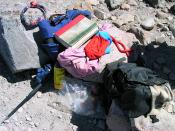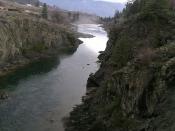Global warming is the gradual increase in global temperatures caused by the emission of gases that trap the sun's heat in the Earth's atmosphere. Gases that contribute to global warming include carbon dioxide, methane, nitrous oxide, chlorofluorocarbons (CFCs), and halocarbons (the replacements for CFCs). The Earth has warmed by 1.1ú F and the Pacific Northwest by 1.5ú F within the last 100 years.1 Global warming will have severe repercussions on the Pacific Northwest, perhaps worse than other places. Some of the major objects that global warming will affect will be the availability of water, fish populations, forests, the coastline, beer, the economy, agriculture, and human health.
Currently, and in the past, the Pacific Northwest receives much of its winter precipitation as snow; which melts throughout spring and summer. This snow melt provides the Pacific Northwest with much of their summer and early fall water. As the Pacific Northwest warms more of the Pacific Northwest's winter precipitation will be coming as rain; there will be less runoff in the spring and summer and less water available in the summer and fall.
The Pacific Northwest currently uses a very clean and cheap source of power, water power. Hydroelectric power is a very important source of power in the northwest; presently we have an abundance of it, and even sell hydroelectric power to other states. With less water flowing through our rivers and streams in the spring and summer we will have less power and prices will increase, eventually we will have to resort to other nonrenewable and dirtier sources of power.
Fish are a main part of the Pacific Northwest ecosystem; we have many different species of unique and valuable fish that would all be affected by global warming. Fish in the Pacific Northwest are very sensitive to...


